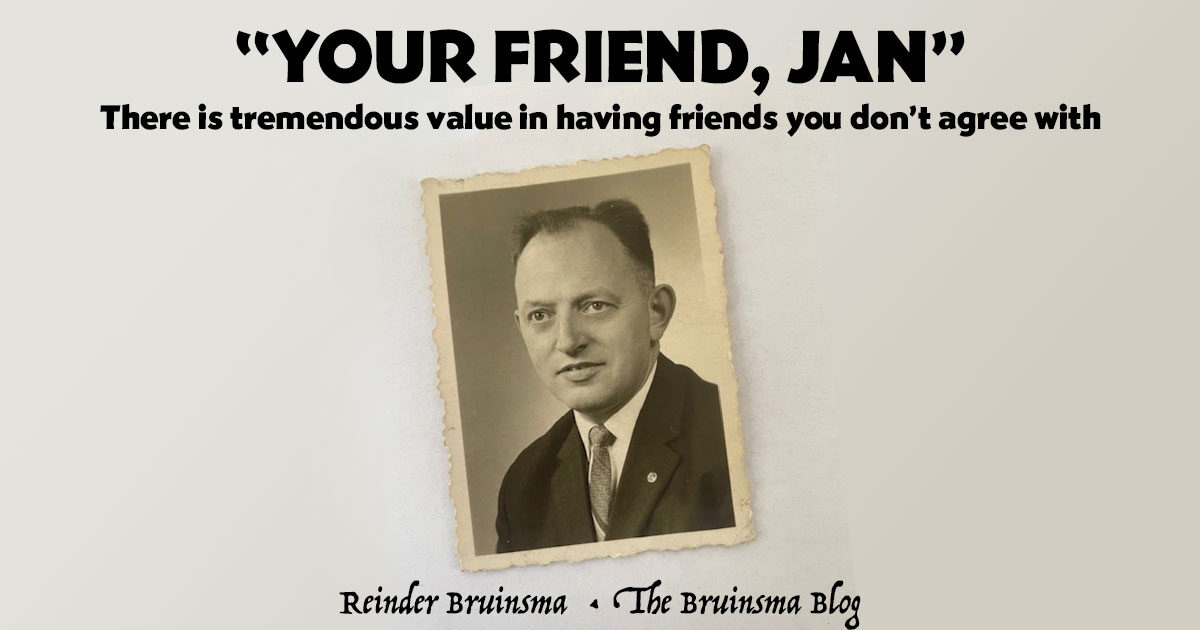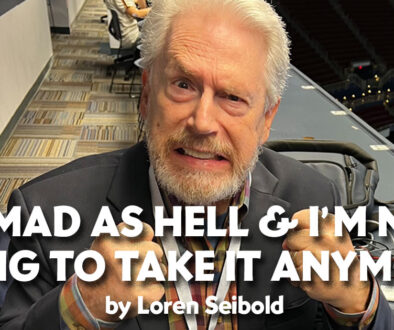“Your Friend, Jan”: The Value of Friends You Don’t Agree With
by Reinder Bruinsma | 6 March 2025 |
Ten years ago Pastor Jan T. Knopper died in far-away (for me) Australia.
Jan Knopper was a Dutchman. He worked his entire working life in the publishing branch of the Seventh-day Adventist Church as a coordinator of literature evangelism, first in the Netherlands at the union level, then as a missionary in the Republic of Congo in Africa. Later he served as the publishing director of the Northern-European Division (later renamed the Trans-European Division), before moving to the same position in the Australasian Division. He lived to 91 years old.
In his retirement years Jan spent a significant period as a volunteer in Russia, also in a leadership position in the publishing outreach of the church. There is no doubt that Jan Knopper was a hard worker, totally dedicated to the mission of his church. He and his wife experienced a great tragedy when in 1988 their son Peter Andreas, who served as a missionary in Papua New Guinea, was fatally shot by unidentified assailants.
Jan Knopper’s father had eked out an onerous living as a professional colporteur—as were quite a few Dutch Adventists who had lost their job or were unable to find employment because of their insistence on keeping the Sabbath. I remember the father as a disagreeable person, always full of criticism and negativity. Perhaps his visual handicap had been a factor that made him that way: as a blind person he could not do his work without constant assistance, and from age 10 onwards his son Jan functioned as his door-to-door guide.
That was, of course, not Jan’s choice. As a result, Jan missed out on most of his time in elementary school and on all other formal education—except that, later on, he had a few years of ministerial training through a special arrangement for those who did not have the prerequisite educational background.
If ever there was an autodidact, it was Jan Knopper. He became fluent in English and French, and became also quite well-read in theology—albeit mostly opting for books of a conservative nature. Towards the end of his life he even chaired a national chapter of the Adventist Theological Society!
I knew him from the time when he worked in the Netherlands. Soon after he was employed by the denomination, he became the part-time pastor of the small church of which my mother was a member, besides also functioning as a part-time assistant literature-evangelism (LE) leader in the Netherlands Union. Shortly afterwards his boss—the union LE leader—was discontinued in his job because of “a moral fall”—and Jan was elevated to this union position. When a few years later a call came for a missionary assignment in Congo, he accepted the challenge to move to a Francophone environment on the African continent.
Over the years, I subsequently met Jan Knopper from time to time when he furloughed in his home country, together with his wife, Reintje. To be honest: I did not like him at that time. He was extremely conservative in his theology and was rather harsh in his judgment of many of his colleagues and of trends and events in the church in his native country. Later on, he was often very critical of many of the things I had initiated as a leader of the Dutch Adventist Church and seemed quite ready to put a negative spin on many of the projects that were started.
But somehow, we managed a frequent email correspondence during the last five years of his life. His messages always ended with the words Your friend, Jan.
An unlikely friendship
People who know me and who also have known Jan Knopper might be rather amazed when they hear that we were in regular email contact. After all, we were a somewhat unlikely combination: an arch-conservative man in far-away Australia, and someone who was, and still is, seen by some—with a degree of justice—as rather liberal.
In 2011, I was in Australia for a few lectures during a conference organized by Avondale College—the Australian Seventh-day Adventist institution of higher learning, some 120 kilometers from Sydney, that a few years ago received full university status. Jan Knopper lived just a few miles away from the Avondale campus. He had heard that I was in the area and sent word that he hoped I would pay him a visit. With some reluctance I drove on the Sabbath afternoon in my rental car the short distance to the retirement village where he lived. I hoped I would be able to get away after less than an hour, but it turned into a five-hour visit.
This visit to Jan came at a crisis-moment in his life. Reintje’s physical condition had deteriorated to the point that she had to move into a care home. (It happened the very next day after our visit.) After a long life together they were now to be separated. The man who had always appeared so unapproachable to me was now exceedingly vulnerable, and desperately needed someone with whom he could share his devastation.
Apparently, it helped that we could talk in his native language. He did almost all the talking that afternoon. A few days later he sent me an email to thank me that I had come to be with him and his wife. He was very grateful that I had spent so much time with them, and had offered a listening ear. It had done him a lot of good, he said, at that difficult moment in his life.
Agreeing to disagree
After this visit, somehow our email correspondence started. He wrote to me about lots of things that he disagreed with. At times he had heard (through very conservative channels) about the terrible things that supposedly were happening in the Dutch Adventist Church. I responded by asking him to consider whether he had actually heard the full story, or whether he might have received one-sided information. I told him about the many positive things that I felt were happening in the Dutch church.
He was a staunch admirer of Ted N.C. Wilson, the president of the Adventist world church since 2010. I told him I did not share in this adoration, and why this was the case. He totally disagreed with my (what he considered) too ecumenical views. He believed I was way off in many of my interpretations of Daniel and the Revelation. For him the pope remained the “little horn” and the “beast,” whom we should carefully watch. Of course, he was also vehemently against ordaining women pastors. And, of course, he would not hear of any recognition of monogamous same-sex relationships as a legitimate option, and any acceptance of such an “abomination” in the church.
I responded to him, at times very carefully, but more often quite clearly. In most cases he continued to disagree. But gradually my respect and sympathy for him grew, and I answered his emails at considerable length. It happened occasionally that he was willing to revise his views, but that was not very often.
However, we continued to correspond and gradually, I suppose, he came to see me as someone who, like himself, wholeheartedly wanted to serve God, and as a person who wanted to live my faith in an authentic way—even though I had (in his eyes) some terribly liberal ideas. This enabled him to always end his emails to me by wishing me God’s blessings and by signing with “Your friend, Jan.”
What occurred in those few years between Jan Knopper and me is a modest illustration of how people who deeply disagree, and are unable to convince each other with their arguments, may nonetheless have a “brotherly” and friendly relationship, in which they can keep the dialogue going. If that is possible at the individual level, it should also be possible for groups that differ theologically within the church.
Listening with respect is the keyword. I recognize that this may be somewhat more complicated on the collective level than between individuals. But we can all make a small beginning in the personal contacts we have. That this may work a miracle was demonstrated in the correspondence between myself and “my friend Jan.”
 Reinder Bruinsma lives in the Netherlands with his wife, Aafje. He has served the Adventist Church in various assignments in publishing, education, and church administration on three continents. He still maintains a busy schedule of preaching, teaching, and writing. He writes at http://reinderbruinsma.com/.
Reinder Bruinsma lives in the Netherlands with his wife, Aafje. He has served the Adventist Church in various assignments in publishing, education, and church administration on three continents. He still maintains a busy schedule of preaching, teaching, and writing. He writes at http://reinderbruinsma.com/.
His latest book is Adventists and Catholics: The History of a Turbulent Relationship.




